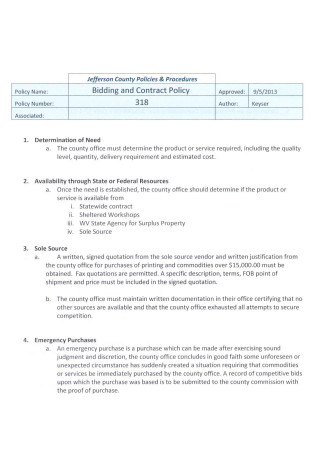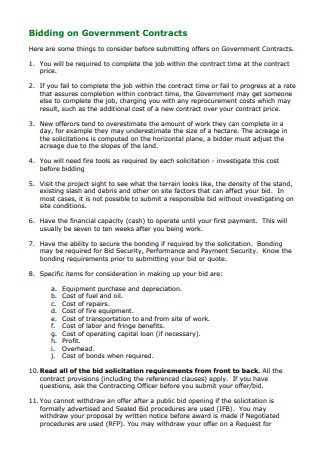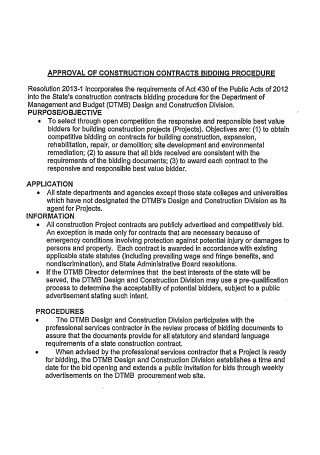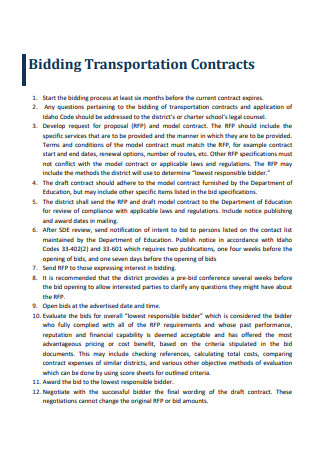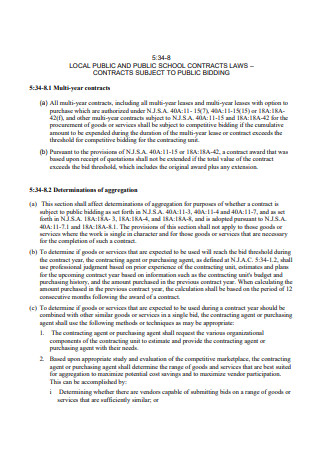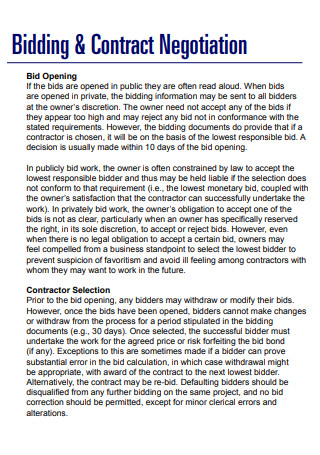5+ Sample Bidding Contract
FREE Bidding Contract s to Download
5+ Sample Bidding Contract
What Is a Bidding Contract?
What Are Contracts for Bid Pricing?
What Is the Difference Between Bids, Tenders, and Proposals?
How to Ensure the Efficiency of the Bidding Contract?
Tips in Making a Bidding Contract
How to Create a Bidding Contract?
FAQs
The project team is only a facilitator for stakeholders who hire them because of their skill, experience, and specialized tools. Other projects originate outside the organization and are managed by the project team. These types of projects are frequently procured through a competitive bidding procedure in which a number of different businesses compete for the opportunity to perform the work. Despite the fact that contract bidding can be a profitable career path, people who are unfamiliar with its structure and procedure may find the process to be confusing. Fortunately, it has a beginning and a conclusion, just like any other endeavor, and knowing the road between those two places begins by following the stages outlined below.
What Is a Bidding Contract?
A bidding contract is a tool that you can use to attract new clients or customers to your business. Through the use of a bidding contract, you can quickly distinguish your company as one that stands out from the competition. The most critical aspect to remember is that you want your target audience to feel the same way as you do. A bidding contract is a type of Simple
Contracts can be utilized in a variety of different industries, such as construction. Construction and real estate, on the other hand, are the industries where it is most advantageous. In contrast to an advertising contract, which is primarily and particularly focused on advertising services, processes, and agreements, a bidding contract really bases its content on the specific project that an organization would like to bid on and the processes and agreements that go along with them. Other templates are available on our website, and you can use them whenever you need them. They are as follows: business proposal, decision support bidding contract, international competitive bidding contract, labor contract, county bidding contract, construction bid forms, project bidding contract, domestic bidding contract, bid proposal, tenancy contract, disclosure agreement, and other similar templates are available. This post will not only provide you with templates but will also provide you with important information that you need to know in order to complete your template.
What Are Contracts for Bid Pricing?
Pricing is one of the most important considerations in the bidding process. The price you choose must take into account not just the products and services offered by your competitors, but it must also be competitive enough to generate a profit for your firm. While government contracts are frequently awarded to the lowest bidder, this is not always the case when dealing with local businesses.
Other aspects of the bid that might help you stand out from the competition include the turnaround time and the quality of the work that you are offering. If your company is awarded the contract bid, you will have the opportunity to further negotiate the final price and terms of the deal.
What Is the Difference Between Bids, Tenders, and Proposals?
Although the terms bid, tender, and proposal appear to be synonyms, they might signify quite different things depending on the firm in which you work. Before beginning any contract bid, it is critical to understand what these terms and definitions mean.
1. Bid
A bid is frequently used to solicit new business or to secure recurrent business. As a result, a bid will be the result of a collaborative effort by people of the organization with varying levels of power. A bid will often be handled by a bid manager, who will communicate with experts in a variety of fields, from technical to legal. A bid is also the phrase used to describe an offer made in response to a request for proposals or an invitation to participate in a tendering process.
2. Tender
Even though they are spelled differently, the terms tender and bid are nearly interchangeable in meaning. When an organization seeks a project, the phrase bid is commonly used, whereas the term tender is more frequently used when an organization seeks a contract. An equivalent job to the bid manager exists in the post of tender manager as well. In many cases, a project manager can also perform this function.
3. Proposal
A proposal is a written document that is sent by a seller to a prospective buyer to solicit their business. It is just one step in a much longer and more involved sales process. Proposals are more client-centered and highly customized, offering solutions that are specific to the buyer’s requirements. They are written by a proposal writer who tailors the proposal to the needs of the customer or buyer. They can benefit from the assistance of a technical specialist who is less concerned with selling and more concerned with design and functionality. If the job is extremely difficult, a technical writer may be hired to address the technical parts of the proposal in a more knowledgeable and straightforward manner.
How to Ensure the Efficiency of the Bidding Contract?
Just as you would when writing Partnership Contracts, you should make certain that your bidding contract can demonstrate how you can provide solutions and answers to the current difficulties and problems experienced by the other party involved in the transaction before submitting it. Making a bidding contract that is mutually advantageous will assist you in closing a business deal. Here are some suggestions about how to put together a bidding contract that is effective:
1. Ensure that All Items Are Up to Date
Always make certain that all of the things in your bidding contract are exacting and up to date. This might assist you in attracting customers in the most realistic manner feasible. If this can be accomplished, it will be quite simple to develop confidence and credibility in the transaction. It is also critical to keep the content of a Rental Contract and other types of business contracts up to date in order for these papers to be as effective as possible.
2. Clarify Strong Points
Clarify the aspects of your personality that have led you to believe that you are the best candidate for the project. A bidding contract must provide you with the opportunity to impress your target audience in a way that is superior to that of the other bidders and your primary competitors. You might also be interested in contract proposal examples.
Tips in Making a Bidding Contract
The use of a bidding contract, such as Business Contract examples, can assist all parties to a transaction in becoming more aware of the possibility that a specific project agreement will be reached. Consequently, the bidding contract that you will employ must be compelling enough that your target audience will be persuaded to sign the legal document and begin the project discussion and other necessary activities as a result. The following are some examples of items that can be included in a bidding contract to assist you:
How to Create a Bidding Contract?
In addition to government work, which requires a request for proposals (RFP), long-term contracts as a provider of a product or service to a larger conglomerate are also possible under the umbrella term “contract.” No matter what form of contract is sought, however, the procedures for submitting a bid for that contract are essentially the same.
Step 1: Research and Planning
Before you may submit a bid, you must complete the necessary due diligence. That entails identifying projects that are a good fit for your company’s capabilities. You should only bid on projects in domains in which you have a great deal of experience and have already demonstrated your ability to perform. In a competitive sport, contract bidding rewards the organization with the best players, strategy, and track record, and the goodies are awarded to the winner.
When considering a project, you can use your business plan report as a resource. If the project is aligned with your company’s goals, you should begin developing a strategy immediately. That strategy must include reasons why your company is the most qualified to take on the job, so do your homework on the company you’re bidding against. Make use of all of the information available to you in order to structure your proposal to suit their unique specifications.
Step 2: Prepare the Bid
Following your research and the development of a preliminary plan to demonstrate why your company is a good fit for the project, you will need to tailor your business plan to demonstrate how you will be able to meet the bid requirement. Of course, you must take into account the price of supplies, time, and labor, but you must never be underbid for a task in order to get it.
It’s easy to believe that whoever reads your proposal would simply skim over the intricacies and focus solely on the bottom line, but this is simply not the case. To put it another way, the person that submits the lowest bid for a project does not always win.
Step 3: Submit the Bid
It is possible to submit the bid in any number of ways. Federal, state, and local governments frequently provide an online portal where you can submit your bid for consideration. If this is the case, be certain that you understand how the platform operates and that your contribution is received accurately. Make no last-minute blunders, or you’ll lose all of your hard work, or you’ll end up having to call and look ridiculous.
Private sector bids, on the other hand, may not necessitate the submission of proposals online. In any case, digital distribution is becoming the norm, and many, if not all, businesses will require your proposal to be transferred to a cloud server or some other digital deposit location for large files. Although digital data are more easily transmitted, it is always a good idea to double-check the submission requirements because some stakeholders may prefer hard copies of the files. Observe the guidelines at all times.
Step 4: Presentation
You completed your homework, you filed your bid, and now you’ve been invited to meet with the corporation to discuss your proposal. Congratulations, you have successfully navigated one obstacle, but you have not yet reached the finish line! You’ll be invited to give a presentation and meet the people with whom you hope to collaborate in the future. This, like submitting a bid, is something that may be accomplished in a variety of ways. In spite of the fact that it is customary to meet in person and that most businesses still appreciate the human touch, you may be required to present online via a video-conferencing tool. Perhaps the organization is located a long distance away, or perhaps they are really busy and prefer to retain everything in digital format. You should simply be prepared to give your best effort, regardless of where the meeting is happening.
It doesn’t matter where you go, the most important thing is to make sure you’re prepared for any questions you’ll be asked, and you’ll be asked many questions. You will almost certainly find yourself discussing the price of the bid, so be prepared to make a counteroffer or to stand fast on your original offer. Keep in mind that you have the ability to bargain as well. If the bid price is a deal-breaker, be prepared to change the quality, labor, or some other aspect of your bid in order to win the contract.
Step 5: Awarded with the Contract
As the bidding process comes to a conclusion, it is important to understand when the company will make its final decision. If you received it, that’s fantastic; you’ll find out sooner rather than later. Although you would like to know when they reject your proposal, you do not want to waste any more time or energy on a dead-end opportunity, therefore you should ask when they reject your bid. You’ll want to know when the contract will be granted so that you can make sure all of your ducks are in a row and aren’t caught off guard when it happens. It’s likely that the employer will want you to start as soon as possible. Not that the awarding firm will want you to start working as soon as they tell you to, but you’ll want to start communicating as soon as possible to ensure that everyone is on the same page and that work is scheduled according to their specifications. Your ability to successfully move from bidding to contracting the work will determine how long you will have a working relationship with the business and whether you will be sought out for more projects.
Make certain that the bidding contract that you will draft has the greatest chance of allowing your company to win the transaction. Providing that you keep your attention on the wants and requirements of your clients, this is possible to do. Please remember to refer to our downloadable contract examples when creating a bidding contract in order to avoid mistakes.
FAQs
What Is a Bid Quote?
In finance, a bid quote is a price quote that is two-way in nature, and it reflects the best potential price at which a security can be sold and purchased. The asking price, which is also known as the bid and offer, is the lowest price at which a product is being offered for sale.
Can a Construction Contractor Use a Winning Bid Proposal?
In the event that you are a construction contractor seeking a winning bid proposal, then the construction bid proposal listed above is just what you are looking for. Our document can be used for a variety of projects, including commercial, residential, and government ones. It contains the usual provisions that are required for any project. You have complete control over how it is configured to meet your requirements.
How to Submit Bid for a Government Contract?
The process of submitting proposals for government bid opportunities is heavily controlled, and the process of winning government contracts can be quite competitive. In order to submit an application for government solicitations, you will often be required to build a profile with the System for Award Management (SAM), which is a vendor-specific database.
Creating a contract bid is a project in itself, and if you are awarded the contract, you will be faced with yet another project. A large number of projects necessitates the use of thorough scheduling and reliable information. In order to be effective, the structure of a bidding contract must be appropriate for the situation. That is to say, it should be built in accordance with the specifications put out by the company that is collecting proposals. Individuals are turned off when you include superfluous information in your bid proposal. The second most crucial consideration is the content, which should be mobile-friendly. You should not just define the tasks that must be completed; instead, you should emphasize the methods that will be used to complete the project.

